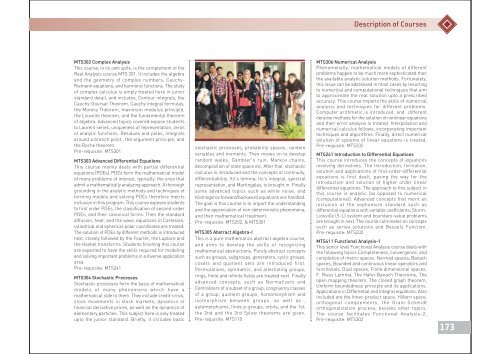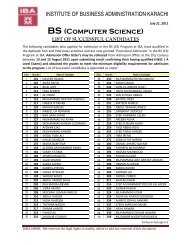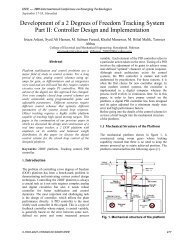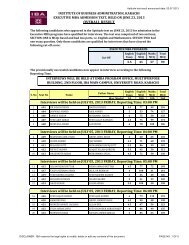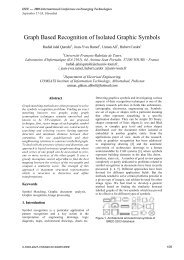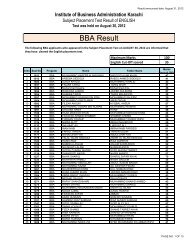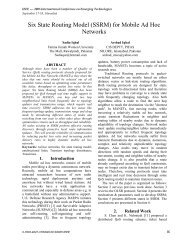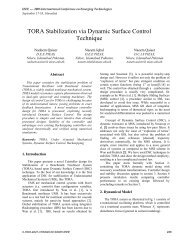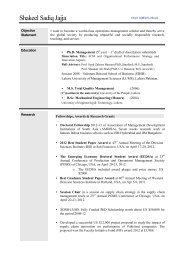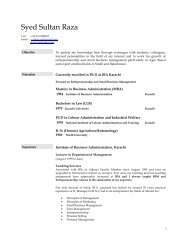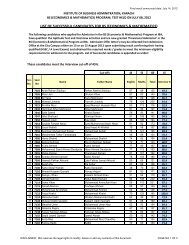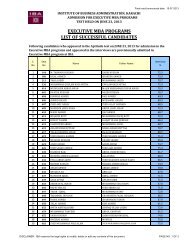Program Announcement 2013 - 14 - Institute of Business ...
Program Announcement 2013 - 14 - Institute of Business ...
Program Announcement 2013 - 14 - Institute of Business ...
Create successful ePaper yourself
Turn your PDF publications into a flip-book with our unique Google optimized e-Paper software.
Description <strong>of</strong> CoursesMTS302 Complex AnalysisThis course, in its own spite, is the complement <strong>of</strong> theReal Analysis course MTS 301. It includes the algebraand the geometry <strong>of</strong> complex numbers, Cauchy-Riemann equations, and harmonic functions. The study<strong>of</strong> complex calculus is amply treated here in juniorstandard detail, and includes, Contour integrals, theCauchy-Goursat Theorem, Cauchy integral formulas,the Morera Theorem, maximum modulus principle,the Liouville theorem, and the fundamental theorem<strong>of</strong> algebra. Advanced topics covered expose studentsto Laurent series, uniqueness <strong>of</strong> representation, zeros<strong>of</strong> analytic functions. Residues and poles, integralsaround a branch point., the argument principle, andthe Roche theorem.Pre-requisite: MTS301MTS303 Advanced Differential EquationsThis course mainly deals with partial differentialequations (PDEs). PDEs form the mathematical model<strong>of</strong> many problems <strong>of</strong> interest, typically, the ones thatadmit a mathematically analyzing approach. A thoroughgrounding in the analytic methods and techniques <strong>of</strong>forming models and solving PDEs therefore meritsinclusion in this program. This course exposes studentsto first order PDEs, the classification <strong>of</strong> second-orderPDEs, and their canonical forms. Then the standarddiffusion, heat, and the wave, equations in Cartesian,cylindrical and spherical-polar coordinates are treated.The solution <strong>of</strong> PDEs by different methods is introducednext, closely followed by the Fourier, the Laplace andthe Hankel transforms. Students finishing this courseare expected to have the skills required for modelingand solving important problems in a diverse applicationarea.Pre-requisite: MTS241MTS304 Stochastic ProcessesStochastic processes form the basis <strong>of</strong> mathematicalmodels <strong>of</strong> many phenomena which have amathematical side to them. They include credit-crisis,stock movements in stock markets, dynamics <strong>of</strong>financial derivative prices, as well as the dynamics <strong>of</strong>elementary particles. This subject here is only treatedupto the junior standard. Briefly, it includes basicstochastic processes, probability spaces, randomvariables and moments. Then moves on to developrandom walks, Gambler's ruin, Markov chains,decomposition <strong>of</strong> state space etc. After that stochasticcalculus is introduced and the concepts <strong>of</strong> continuity,differentiability, Ito's lemma, Ito's integral, spectralrepresentation, and Martingales, is brought in. Finallysome advanced topics such as white noise, andKolmogorov forward/backward equations are handled.The goal is this course is to impart the understandingand the appreciation <strong>of</strong> non-deterministic phenomena,and their mathematical treatment.Pre-requisite: MTS202, & MTS301MTS305 Abstract Algebra-IThis is a pure mathematics abstract algebra course,and aims to develop the skills <strong>of</strong> recognizingmathematical abstractions. Purely abstract conceptssuch as groups, subgroups, generators, cyclic groups,cosets and quotient sets are introduced first.Permutations, symmetric, and alternating groups,rings, finite and infinite fields are treated next. Finallyadvanced concepts, such as Normalizers andCentralizers <strong>of</strong> a subset <strong>of</strong> a group, congruency classes<strong>of</strong> a group, quotient groups, homomorphism andisomorphism between groups, as well as ,automorphisms, finite p-groups, orbits, and the 1st,the 2nd and the 3rd Sylow theorems are given.Pre-requisite: MTS110MTS306 Numerical AnalysisPhenomenally, mathematical models <strong>of</strong> differentproblems happen to be much more sophisticated thanthe available analytic solution methods. Fortunately,this issue can be addressed in most cases by resortingto numerical and computational techniques that aimto approximate the real solution upto a prescribedaccuracy. This course imparts the skills <strong>of</strong> numericalanalysis and techniques for different problems.Computer arithmetic is introduced, and differentiterative methods for the solution <strong>of</strong> nonlinear equationsand their error analysis is treated. Interpolation andnumerical calculus follows, incorporating importanttechniques and algorithms. Finally, direct numericalsolution <strong>of</strong> systems <strong>of</strong> linear equations is treated.Pre-requisite: MTS232MTS241 Introduction to Differential EquationsThis course introduces the concepts <strong>of</strong> equationsinvolving derivatives. The Introduction, formation,solution and applications <strong>of</strong> first-order-differentialequations is first dealt, paving the way for theintroduction and solution <strong>of</strong> higher order lineardifferential equations. The approach to this subject inthis course is analytic (as opposed to numerical/computational). Advanced concepts that merit aninclusion at the sophomore standard such asdifferential equations with variable coefficients; Sturm-Liouville (S-L) system and boundary-value problemsare brought in next. The course culminates on conceptssuch as series solutions and Bessels Function.Pre-requisite: MTS232MTS411 Functional Analysis-1This senior level Functional Analysis course deals withthe following topics.Completeness, convergence, andcompletion <strong>of</strong> metric spaces. Normed spaces, Banachspaces, Bounded and continuous linear operators andfunctionals, Dual spaces, Finite dimensional spaces,F. Riesz Lemma, The Hahn-Banach Theorems, Theopen mapping theorem, The closed graph theorem,Uniform boundedness principle and its applications.Applications in Differential and Integral equations. Alsoincluded are the Inner-product space, Hilbert space,orthogonal complements, the Gram-Schmidtorthogonalization process, besides other topics.The course facilitates Functional Analysis-2.Pre-requisite: MTS302173


